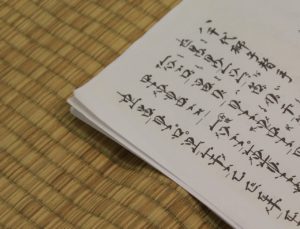Do You Even Need Japanese Pronouns?
Japanese pronouns may be omitted from sentences. Some say this is in contrast to English, but there are many times in everyday speech where this happens in English. For example, “Wanna go?”. Clearly, “you” is inferred. Japanese operates similarly, but the omission of pronouns is not reserved for informal speech.
On the one hand, this makes learning Japanese easier. If you don’t need to say a lot of words, speaking Japanese is a lot simpler, right? Well, not exactly. There are literally dozens of words for the pronouns “I” or “me”. And even more Japanese pronouns that can be translated as “you”.
So, even though you won’t use Japanese pronouns as often as in other languages, you need to learn them and the slight differences between them.
What Are Pronouns?
Pronouns are the words you use instead of the subject’s name. In English, personal pronouns are “I”, “you”, “he”, “she”, “it”, “we”, “you” plural, and “they”. So, as you can see, pronouns are a very important part of English. And you shouldn’t underestimate them in Japanese either.
Why Are There So Many Different Pronouns in Japanese?
In Japanese culture, showing respect is extremely important. So, how you address your parents, elders, bosses, and close friends matters. This honorifics system isn’t unique to Japanese, but having this many pronouns to reflect it definitely is.
In most cases, the Japanese pronoun used will vary depending on the age, gender, and social status of the speaker, and his / her relationship to the person being addressed. So, these slight differences are the reason there are so many different pronouns in Japanese.

List of Japanese Personal Pronouns
Below are some of the more common Japanese pronouns. This list is by no means exhaustive. And we deliberately left out the Japanese pronouns that show contempt or disrespect. When you’re visiting Japan, the last thing you want to do is offend the locals.
You can see all of these Japanese pronouns written in Kanji and Hiragana. Additionally, you can also see the Romaji spelling, so you know how to pronounce it. The quality that really matters for these pronouns though is the formality level and which gender they apply to.
Japanese Pronouns for “I” or “me”
Kanji |
Hiragana |
Romaji |
Formality |
Applies to |
私 |
わたし |
watashi |
moderate |
males and females |
私 |
わたくし |
watakushi |
very formal |
males and females |
我, 吾 |
われ |
ware |
very formal |
males and females |
我が |
わが |
waga |
very formal |
males and females |
俺 |
おれ |
ore |
informal |
males |
僕 |
ぼく |
boku |
informal |
males |
儂 |
わし |
washi |
moderate |
males (mostly) |
自分 |
じぶん |
jibun |
moderate |
males (mostly) |
家, 内 |
うち |
uchi |
informal |
females (mostly) |
小生 |
しょうせい |
shōsei |
formal |
males |
Japanese Pronouns That Mean “you”
Kanji |
Hiragana |
Romaji |
Formality |
Applies to |
貴方, 貴男, 貴女 |
あなた |
anata |
moderate |
males and females |
お宅, 御宅 |
おたく |
otaku |
formal |
males and females |
お前 |
おまえ |
omae |
very informal |
males and females |
君 |
きみ |
kimi |
informal |
males and females |
貴下 |
きか |
kika |
informal |
males and females (typically younger) |
貴官 |
きかん |
kikan |
very formal |
both |
御社 |
おんしゃ |
on-sha |
formal |
males and females |
貴社 |
きしゃ |
ki-sha |
formal |
males and females |
The Pronouns for “he” or “she”
Kanji |
Hiragana |
Romaji |
Formality |
Applies to |
あの方 |
あのかた |
ano kata |
very formal |
males and females |
あの人 |
あのひと |
ano hito |
moderate |
males and females |
奴 |
やつ |
yatsu |
informal |
males and females |
彼 |
かれ |
kare |
moderate |
males |
彼女 |
かのじょ |
kanojo |
moderate |
females |
“we” In Japanese

Kanji |
Hiragana |
Romaji |
Formality |
Applies to |
我々 |
われわれ |
ware-ware |
formal |
males and females |
我等 |
われら |
ware-ra |
informal |
males and females |
弊社 |
へいしゃ |
hei-sha |
formal |
males and females |
我が社 |
わがしゃ |
waga-sha |
formal |
males and females |
The Pronoun “they” in Japanese
Kanji |
Hiragana |
Romaji |
Formality |
Applies to |
彼等 |
かれら |
kare-ra |
moderate |
males and females |
Demonstrative Pronouns in Japanese
To enhance your vocabulary even further, here are the most common demonstrative pronouns in Japanese. Usually, these are written in Hiragana, but we also provided the kanji spelling.
Romaji |
Hiragana |
Kanji |
Meaning |
|---|---|---|---|
kore |
これ |
此れ |
this thing / these things (near speaker) |
sore |
それ |
其れ |
that thing / those things (near listener) |
are |
あれ |
彼れ |
that thing / those things (distant from both speaker and listener) |
dore |
どれ |
何れ |
which thing(s)? |
kochira or kotchi |
こちら / こっち |
此方 |
this / here (near speaker) |
sochira or sotchi |
そちら / そっち |
其方 |
that / there (near listener) |
achira or atchi |
あちら / あっち |
彼方 |
that / there (distant from both speaker and listener) |
dochira or dotchi |
どちら / どっち |
何方 |
what / where |
How to Learn Japanese Pronouns
Of course, seeing this much vocabulary for one lesson is intimidating. So, we compiled some quick tips and tricks you can use to quickly and effectively learn all Japanese pronouns. Follow these steps to make the most of your Japanese lessons.
- Practice them in a sentence: Even though you can (and usually will) ommit pronouns from sentences in Japanese, you can still put them in to emphasize the subject of the sentence. So, pretend like you constantly are for the sake of learning them all.
- Say them out loud: While writing these Japanese pronouns is an awesome exercise, you really want to master their pronunciation most. Make sure you know how to say them out loud, should you ever need them.
- Use spaced repetition: Spaced repetition is the key to language learning. Basically, you need to periodically review this lesson until you remember every single Japanese pronoun correctly. This is the trick to improving your memory.
Learn More Than Japanese Pronouns
Of course, knowing how and when to use Japanese pronouns doesn’t mean you’re fluent in the language. Even if it’s a necessary lesson, you need a reliable language learning method to truly master Japanese. And what better and easier way to do that than with OptiLingo?
OptiLingo is an app that isn’t just convenient. This Japanese app can help you reach fluency faster than any other. By only focusing on the most common Japanese words and phrases it saves on study time. So, you can focus on your daily routine more and progress with Japanese as efficiently as possible. Achieve Japanese success with OptiLingo easily!








